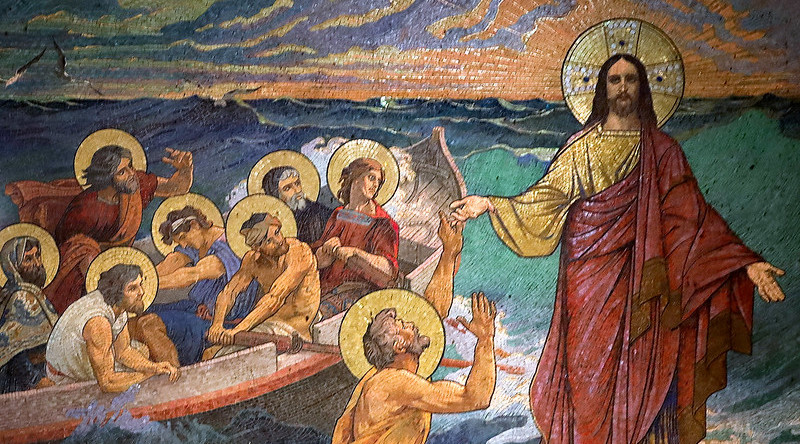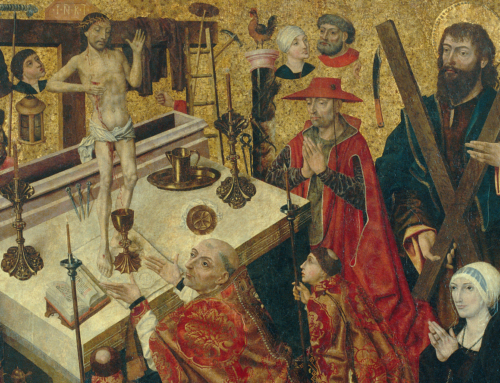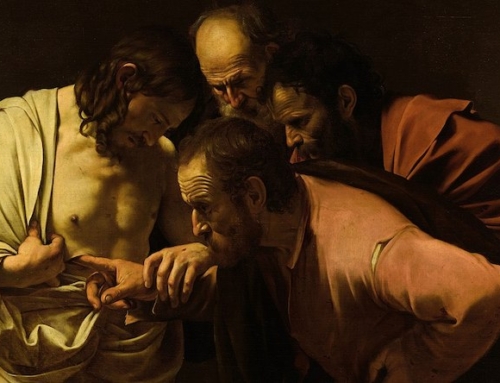In this Sunday’s Gospel, Jesus poses a famous question to Saint Peter: “O you of little faith, why did you doubt?” (Mt. 14:31). How is it that Peter, someone who was so close to the person of Jesus could have such weak faith? I wouldn’t rush to judgment—we see plenty of examples of weak faith today. Polls show that only one-third of American Catholics believe in our Lord’s true presence in the Eucharist. This is a major crisis of faith among our brothers and sisters—a lack of belief in God’s miraculous power and presence. In fact, even if we know and believe that the Eucharist is the body and blood of Christ, our devotion and our wonder at this mystery can wane over time to the point where we are lackluster or even indifferent to the mystery right in front of us. What are we to do when we realize that our faith is not as fervent as it could be?
In the Christian life we must live by faith. The virtue of faith is a gift from God, infused into us at our baptisms. Our belief in God’s presence in the Eucharist requires this gift. Our external senses (sight, smell, hearing, touching, and taste) fail us by only recognizing the accidents, because the host appears unchanged. It still looks, feels, and tastes like bread. We can only know by faith that the substance of the host, that is its essence, is transformed from that of ordinary bread to the body, blood, soul, and divinity of Jesus Christ. Saint Thomas writes that “Faith is a habit of mind whereby eternal life is begun in us making the intellect assent to what is not apparent” (ST II-II, q. 4, a. 1).
Faith is infused in us by God, but it is also built up in us by exterior words and actions—namely, in the Sacred Scriptures, God’s revelation through the instrument of human authors. The Gospels record the life of Jesus Christ: his preaching, miracles, and teachings about the Kingdom of God—signs which lead us to believe in him.
By following these signs in faith, eternal life is begun in us. In Saint John’s Gospel, we read about St. Peter’s act of faith: “Lord, to whom can we go? You have the words of eternal life. We have come to believe and know that you are the Holy One of God” (Jn 6:68-69). Saint Peter, moved by God’s grace, demonstrates his belief that Jesus is the Son of God because of Jesus’ actions and words. Peter’s faith is strong, but as we see in the Gospel passage for this Sunday, it is challenged in difficult moments. Words and actions can help us to believe, but faith, infused into us by God’s grace, is what binds us to the divine mystery. Like Peter, our faith is challenged by difficult circumstances. When we feel that we are, so to speak, sinking–for example by fear, discouragement, loneliness, or simply our own sinfulness–we have recourse to his grace in the sacraments, particularly in Confession and, most especially, in the Eucharist, where he is truly present.
If we sense that our faith is being challenged we must—with haste—turn to prayer. In these moments we can pray the “Act of Faith” prayer:
O my God, I firmly believe
that you are one God in three divine Persons,
Father, Son, and Holy Spirit.
I believe that the Son became man
and died for our sins and that he will come
to judge the living and the dead.
I believe these and all the truths
which the Holy Catholic Church teaches
because you have revealed them
who are eternal truth and wisdom,
who can neither deceive nor be deceived.
In this faith I intend to live and die.
Amen.
More simply, we can pray with the Apostles from Saint Luke’s Gospel, “Lord, increase our faith” (Lk 17:5). It is God who can grant us this grace. We should imitate St. Peter in the Gospel and say “Lord, if it is you, command me to come to you on the water” (Mt 14:28). We move in accord with God’s grace and incline our hearts to accept and believe in the True God. Paralleling St. Peter, we get out of the boat and walk. If we begin to drown, the Lord will save us. when we pray to the Lord and gaze upon him in the Eucharist, we can say, “Truly, you are the Son of God.” (Mt 14:33)
✠
Photo by Fr. Lawrence Lew, O.P. (used with permission)







